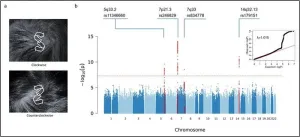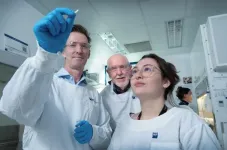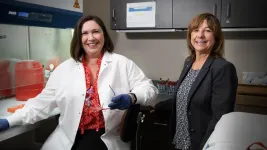(Press-News.org) Through next-generation sequencing, investigators have identified a mutation in the TMCO3 gene in two sisters with short stature.
The research, which is published in the Journal of Bone and Mineral Research, also revealed that the TMCO3 protein is expressed by chondrocytes, cells responsible for bone growth, and that it regulates expression of two other proteins known to control bone growth (parathyroid hormone-related protein and Indian hedgehog). TMCO3 appears to transport protons in exchange for potassium across a protein packaging organelle within cells.
The scientists confirmed that the mutation in TMCO3 was responsible for the sisters’ short stature by analyzing a mouse model lacking the gene and showing that the mice had shortened bones.
“This paper is the result of a great collaboration between the Institute of Human Genetics and the Department of Osteology and Biomechanics, both located at the University Medical Center Hamburg-Eppendorf, in Germany. It shows the importance of ion and pH homeostasis in organismal growth," said corresponding author Kerstin Kutsche, PhD.
URL upon publication: https://onlinelibrary.wiley.com/doi/10.1002/jbmr.4827
Additional Information
NOTE: The information contained in this release is protected by copyright. Please include journal attribution in all coverage. For more information or to obtain a PDF of any study, please contact: Sara Henning-Stout, newsroom@wiley.com.
About the Journal
The Journal of Bone and Mineral Research publishes highly impactful original manuscripts, reviews, and special articles on basic, translational and clinical investigations relevant to the musculoskeletal system and mineral metabolism. Specifically, the journal is interested in original research on the biology and physiology of skeletal tissues, interdisciplinary research spanning the musculoskeletal and other systems, including but not limited to immunology, hematology, energy metabolism, cancer biology, and neurology, and systems biology topics using large scale “-omics” approaches.
About Wiley
Wiley is a knowledge company and a global leader in research, publishing, and knowledge solutions. Dedicated to the creation and application of knowledge, Wiley serves the world’s researchers, learners, innovators, and leaders, helping them achieve their goals and solve the world's most important challenges. For more than two centuries, Wiley has been delivering on its timeless mission to unlock human potential. Visit us at Wiley.com. Follow us on Facebook, Twitter, LinkedIn and Instagram.
END
Loss of a particular protein causes growth defects in mice and humans
2023-08-09
ELSE PRESS RELEASES FROM THIS DATE:
Huge tipping events dominated the evolution of the climate system
2023-08-09
An analysis of the hierarchy of tipping points suggests that during the last 66 million years two events set the scene for further climate tipping and for the evolution of the climate system in particular. If the anthropogenic climate change of today leads to complete deglaciation, the evolution of Earth's climate will be influenced on a geological time scale, the authors suggest. The work by Denis-Didier Rousseau, Université Montpellier, France, Witold Bagniewski, Ecole Normale Supérieure, Paris, France, and Valerio Lucarini, University of Reading, UK is published in Scientific Reports and is part of the European TiPES project on tipping points ...
Electrical signals between skin cells may influence melanoma initiation
2023-08-09
PHILADELPHIA – The transfer of a neurotransmitter from one type of skin cell to another (melanocytes to keratinocytes) altered electrical activity and promoted melanoma initiation in preclinical models, according to results published in Cancer Discovery, a journal of the American Association for Cancer Research.
Melanoma is a deadly form of skin cancer that develops in melanin-containing skin cells known as melanocytes. An intrinsic feature of melanocytes is their ability to secrete melanin-containing vesicles to surrounding skin ...
The voices of indigenous peoples and local communities as an important part of the climate fight
2023-08-09
Coinciding with the International Day of Indigenous Peoples, an ICTA-UAB study calls for indigenous peoples' in-depth knowledge of climate change to be considered.
Indigenous Peoples and local communities around the world have a rich and extensive general knowledge of climate change impacts and possible ways to adapt. This knowledge should be recognised by both science and climate policy.
This is the main conclusion of an international study led by the Institute of Environmental Science and Technology of the Universitat Autònoma de Barcelona (ICTA-UAB) which has spent five years analysing and providing detailed data on how Indigenous Peoples and local communities ...
Having a bad hair day? Blame your genes!
2023-08-09
Philadelphia, August 9, 2023 – The first gene mapping study on human scalp hair whorls not only shows that hair whorl direction has a genetic basis, but also that it is affected by multiple genes. Four associated genetic variants that are likely to influence hair whorl direction are identified, as reported in the Journal of Investigative Dermatology, published by Elsevier.
A hair whorl is a patch of hair growing in a circular pattern around a point specified by hair follicle orientations. As an easily observed human trait, scalp hair whorl pattern is typically defined by the whorl number (single ...
New survey confirms need for more menopause education in residency programs
2023-08-09
CLEVELAND, Ohio (August 9, 2023)—Despite the fact that nearly 90 million women in the United States are projected to be postmenopausal by 2060, menopause remains low on the priority list of many residency programs. A new survey reveals the lack of a standardized menopause curriculum and limited access to menopause educational resources for residents. Results of the survey are published online today in Menopause, the journal of The Menopause Society.
Because women today are living longer, it is not surprising that there are a record number of postmenopausal women. And, that number is only expected ...
Booster shot being developed to avoid recapturing koalas to fight Chlamydia disease
2023-08-09
A booster vaccine using implant technology for koalas is being developed by QUT researchers in the fight against the deadly Chlamydia disease.
The new technology is designed to avoid problems for wild koalas and wildlife handlers having to recapture or hold the animals for 30 days, to receive a second immunisation.
Koala chlamydia is a bacterial infection and is one of the leading causes of death for Australian koalas.
QUT researchers have been successfully testing a two-shot vaccine on an isolated wild koala colony ...
After 15 years, pulsar timing yields evidence of cosmic background gravitational waves
2023-08-09
The universe is humming with gravitational radiation — a very low-frequency rumble that rhythmically stretches and compresses spacetime and the matter embedded in it.
That is the conclusion of several groups of researchers from around the world who simultaneously published a slew of journal articles in June describing more than 15 years of observations of millisecond pulsars within our corner of the Milky Way galaxy. At least one group — the North American Nanohertz Observatory for Gravitational Waves (NANOGrav) collaboration — has found compelling ...
Grant provides cancer research training experience to expand workforce for cancer prevention and control
2023-08-09
University of Arizona Cancer Center researchers were awarded a $1.5 million grant from the National Cancer Institute to deliver an intensive, multidisciplinary cancer prevention and control research training program for undergraduate and graduate students.
According to multiple principal investigators Jennifer Bea, PhD, and Cynthia Thomson, PhD, RD, the goal of the 10-week, full-time summer program is to motivate students to pursue a career in cancer prevention science.
“I am very concerned about the number of skilled scientists and clinicians retiring,” said Dr. Bea, co-leader of the UArizona Cancer ...
World’s largest study shows the more you walk, the lower your risk of death, even if you walk fewer than 5,000 steps
2023-08-09
The number of steps you should walk every day to start seeing benefits to your health is lower than previously thought, according to the largest analysis to investigate this.
The study, published in the European Journal of Preventive Cardiology [1] today (Wednesday), found that walking at least 3967 steps a day started to reduce the risk of dying from any cause, and 2337 steps a day reduced the risk of dying from diseases of the heart and blood vessels (cardiovascular disease).
However, the new analysis of 226,889 people from 17 different studies around the world has shown that the more you walk, the greater the health benefits. ...
Theory meets practice
2023-08-09
(Santa Barbara, Calif.) — Scientific findings don’t always translate neatly into actions, especially in conservation and resource management. The disconnect can leave academics and practitioners disheartened and a bit frustrated.
“We want conservation science to be informing real-world needs,” said Darcy Bradley, a senior ocean scientist at The Nature Conservancy and a former director of UC Santa Barbara’s Environmental Markets Lab.
“Most managers and practitioners also want to incorporate science into their work,” ...






